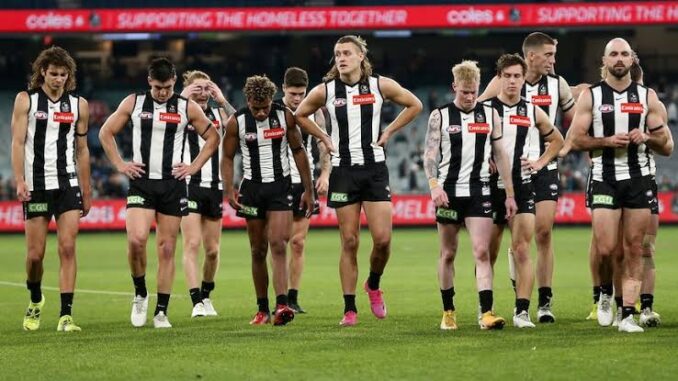
After Collingwood denied in a pivotal Riley Thilthorpe moment against the NQ cowboys, the AFL takes action.
The Australian Football League has once again found itself at the center of heated debate following a controversial incident involving Riley Thilthorpe during Collingwood’s clash with the North Queensland Cowboys. While AFL and NRL distinctions often remain clear, the AFL’s decision to step in highlights the seriousness of the moment and the growing importance of fair officiating in Australian sport.
The incident unfolded late in the contest, with the Magpies pressing for a decisive play. Riley Thilthorpe, a highly rated forward, found himself in a critical position that could have swung momentum in Collingwood’s favor. Yet, in what appeared to be a moment of interference and a potential missed call, Collingwood’s claim for a ruling was denied. Instead of a potential scoring chance, play resumed without correction, leaving players and fans alike stunned. The denial immediately sparked controversy, with commentators pointing to replay angles suggesting that Thilthorpe had been impeded in a way that should have drawn a whistle.
What elevated the drama further was the context: this was not a meaningless midseason fixture, but a match with finals implications. Collingwood, already under pressure to secure ladder positioning, viewed the moment as decisive. Their officials lodged immediate complaints, pressing the AFL to review the call and provide clarity on the umpiring standards that governed the incident.
The AFL’s reaction was swift. Within 48 hours, the league announced that it would conduct a formal review of the officiating. This review, the AFL emphasized, was not simply about one call but about ensuring consistency, accountability, and fairness across all matches. The governing body acknowledged the “pivotal nature” of the Thilthorpe moment and admitted that the denial had warranted deeper scrutiny.
For the AFL, the stakes extend beyond a single match. Umpiring controversies have long been a thorn in the side of the league, eroding fan trust and creating narratives that overshadow the quality of play. With video review technology available, the expectation from supporters is that crucial moments cannot be left to human error alone. The Thilthorpe incident, therefore, serves as a test case for how effectively the AFL can balance speed, accuracy, and transparency in its officiating protocols.
From Collingwood’s perspective, the damage is both practical and psychological. Players and coaches alike expressed frustration, with some hinting at the need for procedural changes to prevent such denials in the future. For Riley Thilthorpe, the spotlight has intensified. Already considered a rising star, his involvement in the controversy places him at the intersection of individual performance and systemic shortcomings.
On the fans’ side, the reaction was predictably intense. Social media lit up with contrasting interpretations: some argued that Collingwood was unfairly robbed, while others maintained that the officials made the correct decision in real time. What united both sides, however, was agreement that clearer systems of accountability must be in place.
Ultimately, the AFL’s decision to intervene marks a turning point. Whether it leads to expanded use of video replay, stricter umpire training, or new match review protocols, the Thilthorpe controversy could reshape how pivotal moments are managed. For Collingwood, the moment may become part of its season-defining narrative. For the AFL, it is a reminder that in a sport driven by passion and precision, no single call is too small to matter.
Leave a Reply